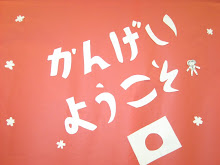Friday: November 13, 2009 An Eight Period Day
JAPANESE 3 -- First period
Quiz on verbs―――たい and adjectives ---そう、Plus kanji.
Homework assignment:
Write a letter to Ichiritsu students about their November visit.
Use notebook paper and double space (or, you may type and double space) Ten sentences in 日本語。 After that, you may add 英語 if you wish.
Begin like this:
市立(いちりつ) の 生徒(せいと) へ
シカゴ に 来て(きて)ありがとう。
End like this:
(your name in katakana) より
REMINDER:
Sentence-ending conjugations for い adjectives:
――い です、――よくない です、――かった です、 ――くなかった です。
Sentence ending conjugations for な adjectives :
――です、――じゃない です {Or で は ありません}、――でした、 ――じゃなかった です {Or で は ありませんでした}
{Explanation for talking about kanji:
{Kanji compound example –人口
{えい語 で いみ は Population という こと です。
{かんじ は 「ひと」 の じん と くち の 「こう」 です。}
JAPANESE 1 – Fifth period
Finish watching 隣のトトロ。
Discussion.
Students handed in language notes on the movie.
Students also handed in the assignment below:
Hiragana practice, write in RŌMAじ。
1。その ぼうし は いくら です か。
2。あの ひと の はな は おおきい です ね。
3。あに は こうこう の せんせい です。
4。 これ は めずらしい と おもいます。
5。 その ふく を いつ きます か。
6。 にちよう日 に きます。
7。 その はなし は だれ も みな きいて います。
8。 いつも おなじ こと を ききます ね。
9。 あの ひと は 日本語 を よんで います。
Homework: Pages 71 – 75 in workbook
Small や、ゆ、よ
Don’t forget kanji:
日、月、木、本
本 As “tree” plus mark indicating root or origin
Japan as “sun’s source” – 日本
にほん 日本
にほんご 日本語
Study!
.
JAPANESE 2 -- Sixth period
Handout from 高校生活book 1, pages 20 and 25
Both kinds of adjectives Finish for Tuesday
Next Monday:
1. re-test on continuative verbs
2. separate vocab test on chapter 2
「Next week:Handout from Obento text workbook – page 23 – reviewing items appropriate for self-introductions」
Ch 2: ききましょう、ぜんぶ
Make sure all work is done in workbook from pages 16 to 21.
Next week: collect――
1Kana word search puzzle for homework.
2Shichi-go-san article -- summary or outline or concept map (POI, in Mrs. Havlik’s terms) (See Japanese 3 section above for article)
Remember these kanji:
目 め Eye
耳 みみ Ear
大きい Big おおきい
手 て Hand
口 くち Mouth
足 あし Feet/legs
New song: “Head and shoulders knees and toes”
あたま、かた、ひざ、足、ひざ、あし
あたま、かた、ひざ、足、ひざ、あし
目 と 耳 と 口 と はな、
あたま、かた、ひざ、足、ひざ、足
Reminder: We all must be polite in the Japanese language classroom. Not only is it important in our lives in general – it is an essential part of Japanese culture. ください、おねがい します、ありがとう、すみません Are the most important words and phrases in Japanese.
JAPANESE 4 and AP – Seventh period
Collect translations of text on November from book on months in Japan. Crucial culture content for AP.
Collect re-typed version of section A of Nakama handout about combining sentences.
Listen to Japanesepod101.com audioblog about Kiyomizu-dera Temple in Kyoto—crucial culture content for AP
Read out loud first two pages of ch 3 of “A Homestay in Japan.”
Introduce giving/receiving verbs and beginning explanation of
a. “our group” giving gifts (outbound gifts) あげる
b. People giving gifts to our group (incoming gifts) くれる
c. Receiving (no matter who) もらう
No honorific or humilific levels explained at this time.
Homework is to finish handout from Nakama workbook, especially be able to respond verbally in section B.
[Next week: Handout from 高校生活book 1, pages 23 and 2
Adjectives for tastes/flavors and difficult pairs (hot and cold liquids, thick and thin books, hot and cold weather)]
About Me

- O.Kimeru
- M.A. 1992 from U. of Chicago; Japan Foundation Fellow in 1987-88; research fellow Yokohama City University; Japanese language teacher since 1991; also taught French (member American Association of Teachers of French), English as a Second Language (to students), methodology of teaching ESL (to Japanese high school teachers), English, Japanese history/culture, drama; in 2002 and 2004, listed in Who's Who Among America's Teachers; member of Chicago Sister Cities Osaka Committee, and chair of its Education Sub-Committee; vice-president Illinois Association of Teachers of Japanese; Payton H.S. World Language Department Chair from 2003-2007, under founding principal Mrs. Gail Ward; taught Japanese and coordinated Japan Exchange at Payton from 2003 to 2010; Japanese teacher at Burr Public School beginning August, 2010
Followers
Blog Archive
-
▼
2009
(146)
-
▼
November
(15)
- November 30, 2009 An Eight Period Day
- Novembeer 24, 2009 An Eight Period Day
- November 23, 2009 An Eight Period Day
- November 20, 2009 An Eight Period Day
- November 18, 2009 A Block Two Day
- November Newsletter for Japanese language program
- November 17, 2009 A Block One Day
- November 16, 2009 An Eight Period Day
- November 13, 2009 An Eight P...
- November 12, 2009 A Block Two Day
- November 10, 2009 A Block One Day
- November 5, 2009 An Eight Period Day
- November 4, 2009 A Block Two Day
- November 3, 2009 A Block One Day
- November 2, 2009 An Eight Period Day
-
▼
November
(15)